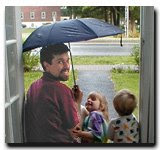Of all the ways I've worked to help save the planet, I'll always cherish one unforgettable Fourth of July. I volunteered myself and my in-laws for the “recycling” crew at the Festival for the Eno in Durham, North Carolina. Despite the heat and humidity (both 97), we reported for duty.
I then discovered the organizers had decided to expand “recycling” to include “composting” for the first time. Our job was to stand knee-deep in garbage, sorting out recyclable plastic from a sea of water melon rinds, cotton candy cones, half-eaten plates of nachos, and other rotting refuse.
I learned three valuable lessons:
My mother-in-law and father-in-law are amazingly forgiving people.
Recycling is just the tip of the garbage iceberg.
A little planning goes a long way when it comes to composting.
In the years since, I've discovered that composting is actually easy—it's less work to make compost than to haul heavy garbage bags—and arguably even more important than recycling. What better future can you imagine for your garbage than to replenish the Earth?
If you're having a family get together for the Fourth and want to make it a little greener this year, think about a composting plan. Some tips:
Figure out ahead of time what you're going to compost. Separate containers make it easy for guests to do the right thing; you won't have to sort through their garbage.
A family picnic is the perfect opportunity to start making a batch of compost. Food scraps like corn husks and watermelon rinds can go right in your compost bin. Use your judgment for other types of waste.
Easy to compost:
vegetables, fruits, grass, bread, coffee grounds, paper towels, tissue paper
Harder to compost without odors or vermin:
cheese, fats, oils, butter, meat, fish, shrimp and lobster shells
Difficult, dangerous or impossible to compost:
pet waste, bones, pressure-treated sawdust, wax-coated paper board, plasticsYou can buy plates, cups and even forks, knives and spoons that will compost completely. There are also garbage bags that look and feel like plastic, but are made out of corn so they will compost.
If you don't own a compost bin and don't want to make a pile, you can still compost. Just dig a hole and bury your food and paper waste about 18 inches deep. In a year or so, worms and soil microorganisms will convert your garbage to “garden gold”.
If you have a good plan and people pitch in, you'll be digging through rich soil by next summer. It sure beats the alternative.
Composting Links and Resources
- Home Composting
University of Maine Cooperative Extension Bulletin #1143
http://www.umext.maine.edu/onlinepubs/htmpubs/1143.htm - How Compost Happens
University of Maine Cooperative Extension Bulletin #1159 http://www.umext.maine.edu/onlinepubs/htmpubs/1159.htm - Composting Bins
http://www.fwhorch.net/garden-and-composting/composting-bins.html - Compost Pails
http://www.fwhorch.net/garden-and-composting/compost-pails.html - Composting Tools
http://www.fwhorch.net/garden-and-composting/composting-tools.html - Composting Supplies
http://www.fwhorch.net/garden-and-composting/composting-supplies.html - Composting Books
http://www.fwhorch.net/garden-and-composting/composting-books.html


No comments:
Post a Comment